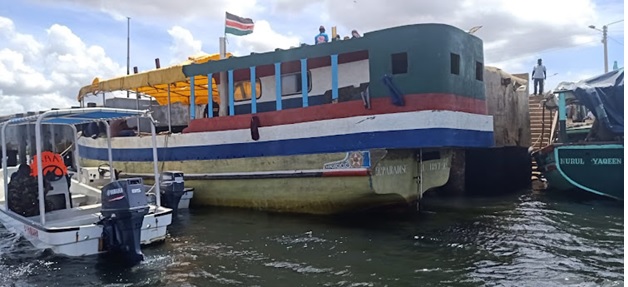The ban on cross-border activities between Kenya and Somalia continues to negatively impact the socio-economic lives of border communities in the region.

Image: CHETI PRAXIDES
In 2019, the Kenyan government imposed a ban to curb human trafficking, drugs, terror attacks and smuggling of contraband goods.
The situation has strained trade, business, livelihoods and community interactions as residents struggle to conform.
Lamu residents on border areas of Kiunga, Ishakani and Ras Kamboni who have intermarried with the neighbouring Somali counterparts from Kismayu and Mogadishu have complained of strained family relations as well as families being forced to stay apart.
Saddam Aboud who is from Ishakani in Lamu has been unable to attend to his two Jewelry businesses in Kismayu due to the ban.
Aboud whose wife is of Somali origin says he has had to close down the businesses since last year as he awaits the lifting of the ban.
“This is bad for business and it’s lasting longer than we expected. Let the government consider what it’s doing to livelihoods,” Aboud said.
Nadina Asman,24, from Kiangwe in Lamu is a bitter woman because the ban led to the cancellation of her wedding to her Somali fiance Osman Latif from Kismayu.
Her fiancé married someone else.
“We had prepared for six months and the ban came just as his people were preparing to come and pay my bride price,” Nadina says.
“The communication died soon after. I heard he married a Somali girl from his village.”
Affected Kenyans have termed the ban as both unfair and unreasonable.
Community elder Muhashiam Fumo of Ishakani says the government needed to have considered that nationals from both sides had heavily invested emotionally, financially and socially in the two countries.
“This ban has broken families and marriages. It has wrecked livelihoods and pulled down good businesses. It was quite insensitive,” Fumo said.
Somali residents especially pregnant women and children of Ras Kamboni and neighbouring areas would heavily rely on the Kiunga health centre, the only medical facility on the border for antenatal and postnatal care and immunisations.
With the ban in place, that doesn’t happen anymore.
Residents are worried that the ban will soon spill over to ugly economic and social feuds between the two countries.
The border areas are among the most highly guarded in the region with thousands of troops manning various entry points.
Source: The Star


